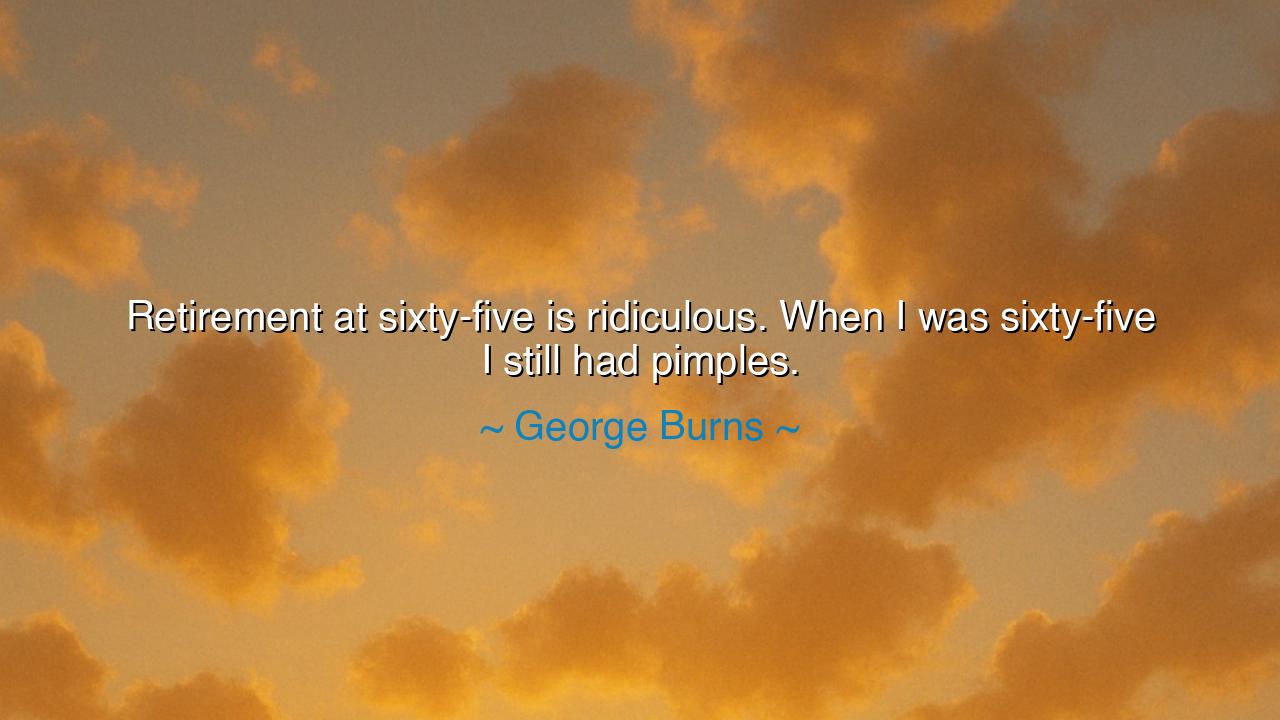
Retirement at sixty-five is ridiculous. When I was sixty-five I






"Retirement at sixty-five is ridiculous. When I was sixty-five I still had pimples." - George Burns. With this remark, George Burns delivers a humorous yet profound observation on the concept of aging, work, and the often arbitrary boundaries set by society. In a world where retirement is often viewed as the natural and expected outcome of a long working life, Burns challenges this idea by highlighting how the physical aging process—marked by things like pimples—does not fit neatly into the framework of traditional retirement. His words poke fun at the expectation that one’s capacity to work or engage with the world should end by a certain age. Instead, Burns underscores a deeper truth: that age does not inherently limit one’s energy, creativity, or contribution to society.
In many cultures, particularly in the ancient world, the idea of retirement would have been foreign to the lives of great figures like Socrates and Plato. These philosophers did not cease their work upon reaching a certain age; rather, they continued to engage with the world until the very end of their lives. Socrates, despite his advanced age, was still teaching and discussing profound ideas with young men, guiding the minds of his city with his philosophy. His later years were filled with intellectual vigor, not a retirement from life, proving that the mind does not fade simply because the body ages. In this sense, Socrates' life exemplifies Burns’ point that retirement is not a natural or necessary conclusion to a life well-lived.
Take also the example of Benjamin Franklin, who, even in his later years, was deeply involved in scientific experiments and diplomacy. Franklin, who was already in his 70s when he contributed to the drafting of the U.S. Constitution and represented America in France, clearly did not subscribe to the belief that age should limit one’s contributions. Franklin’s creative spark, even in his old age, was still vibrant, demonstrating that life after 60 can still be filled with purpose, discovery, and passion. His life stands as evidence that retirement at any specific age—especially at sixty-five—does not align with the realities of human potential.
Burns’ words also challenge the linear view of life that sees one’s prime years as the only time for achievement. He dismisses the notion that retirement should mark the end of one’s usefulness, and instead embraces a view of life that is more fluid and dynamic. Age, Burns suggests, does not diminish one’s capacity to contribute; it simply means that the way we engage with life may shift. As we grow older, we gain wisdom, experience, and a deeper understanding of the world, which should, in theory, make us even more valuable—not less. The idea that one should retreat into rest at a certain age is a narrow concept, one that limits the richness of what older generations can still offer.
In ancient Roman times, figures like Cicero continued to engage with political and intellectual life well into their senior years. His speeches, writings, and thoughts shaped the thinking of generations, showing that retirement was not the destiny for those who sought to remain active in society. Cicero did not let age stop him from fighting for the republic and contributing to philosophy. His endurance in thought and action was fueled by a profound sense of purpose—something that Burns reflects on in his quote. It’s not just about how many years we live, but how we live those years.
Burns’ statement also highlights the absurdity of assigning arbitrary age markers to when we are supposed to slow down, retire, or stop contributing. In today’s world, the expectation is that at 65, one should stop working, stop striving, and begin to withdraw from the public sphere. However, as Burns shows, this is often a disservice to the individual and society. True purpose and engagement do not have an expiration date. Moses, in his later years, led the Israelites out of Egypt, a feat of leadership that came not in the prime of his life, but in his old age. His story, like Burns’, reminds us that the greatest contributions often come when one is in the later stages of life—when experience, wisdom, and the passion to leave a mark are allowed to thrive.
The lesson from George Burns is clear: do not accept the arbitrary age restrictions placed on purpose and contribution. Life does not end at sixty-five, and neither should one’s work or creative endeavors. Instead of viewing aging as a time for retirement, we should embrace it as an opportunity for reinvention, continued growth, and meaningful contributions. In practical terms, this means actively seeking to engage with life at every age, to pursue new passions, and to remain involved in the world around you—not because you “should,” but because you can, and because the world needs your experience and energy.
Finally, the practical action that Burns’ quote encourages us to take is this: reject retirement as a fixed point in life. Instead, find ways to continue learning, growing, and contributing—whether through work, creativity, or community involvement. Live each day as if your best years are ahead of you, not behind you. The spirit of curiosity and purpose can be cultivated at any age, and as Burns humorously suggests, even at 65, you may still have a lot of youthful energy to offer the world.






AAdministratorAdministrator
Welcome, honored guests. Please leave a comment, we will respond soon